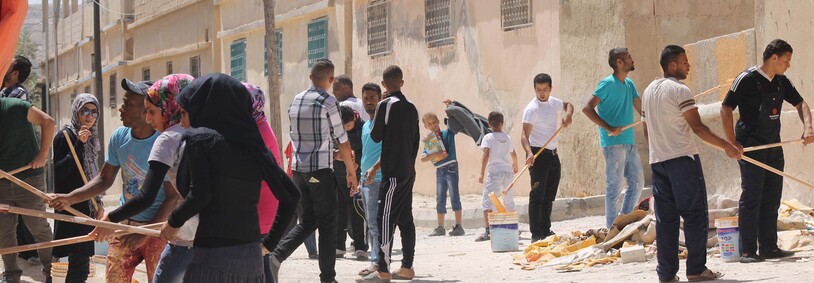
New prospects for refugees
10.09.2015 – When refugees in the Middle East and elsewhere are no longer simply fighting for survival and to meet their basic material needs, they can start taking control of their own lives again.
According to the United Nations, there are currently almost 60 million forcibly displaced persons worldwide. Figures from the UN Refugee Agency (UNHCR) show that five million of these are Palestinian refugees, who have been affected by armed conflict and war since the 1940s. Most of them are in Gaza and the West Bank or in the neighbouring countries Lebanon, Jordan and Syria, and many still live in refugee camps. Now they are being joined by countless others fleeing Syria and Iraq out of fear for their lives. The Deutsche Gesellschaft für Internationale Zusammenarbeit (GIZ) GmbH helps refugees to rediscover their courage and find meaning in their lives, despite their difficult situation. This prevents many from turning to radical ideas and extremism.
GIZ’s activities, which it is carrying out on behalf of the German Federal Ministry for Economic Cooperation and Development (BMZ), target individuals directly to strengthen their self-esteem. The aim is to help refugees relearn how to shape their own living conditions. Refugees like the young people in Husn Camp in Jordan, which in the 50 years since it was established has turned into a small town with 25,000 residents who live in ramshackle stone houses. Keen to make a difference, a group of young people came up with the idea of painting the buildings. In workshops run by GIZ they learned how to put forward persuasive arguments to drum up support among their peers. They also held endless discussions with homeowners to encourage them to take part. And they were very successful – almost everyone got involved.
The residents took pride in their ‘colourful project’, and it made headlines across the country. The story even found its way into the international media. For the young volunteers themselves, the project provided an opportunity to develop their own personalities. ‘We supported the young people’s self-help groups and refugee committees to give them an organisational structure,’ says Gudrun Kramer from GIZ, who works with the refugees. There is now less prejudice against Husn Camp and the residents are finding it easier to get work in the surrounding area.
Across the country, refugee representatives take part in public dialogue and help shape opinion. On behalf of BMZ, GIZ also promotes exchange between refugee organisations, local authorities, international aid organisations and the governments in Lebanon, Jordan and the Palestinian territories. ‘Our activities are increasing acceptance of refugees in the host countries,’ reported Kramer in Frankfurt at the most recent public event in the Development Forum series, which is organised by GIZ, the Frankfurter Rundschau newspaper and the broadcaster Hessischer Rundfunk. ‘By getting involved, all of these young people have learned that they can shape their own lives by taking lots of small steps, rather than through one big radical change.’